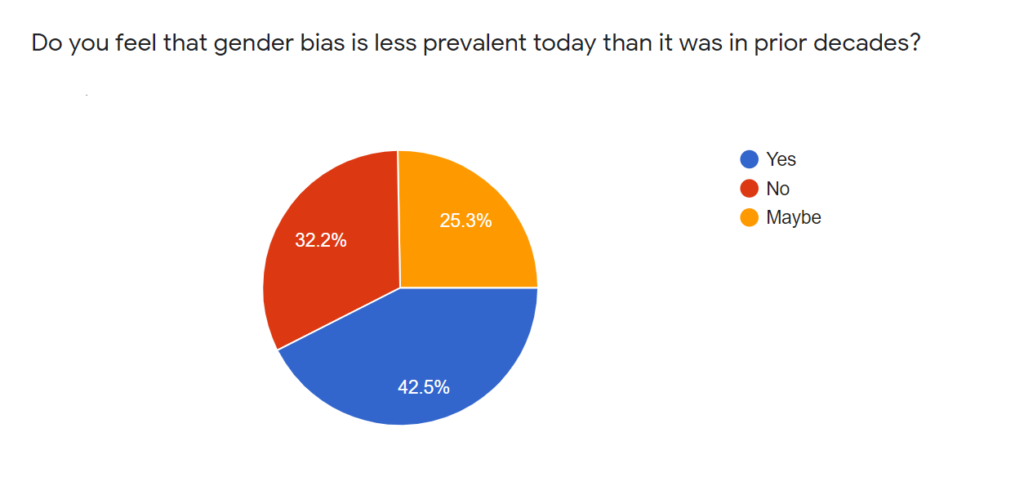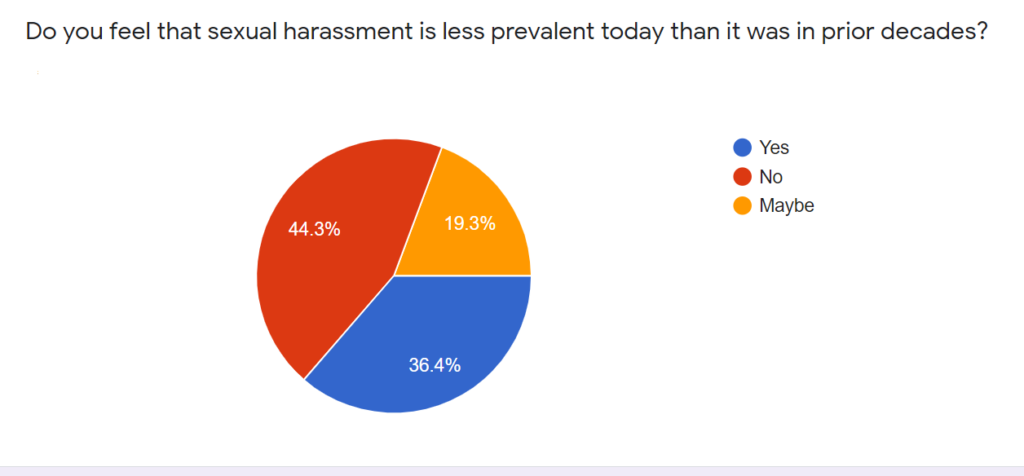Fully 54 percent of the respondents to an April 2021 Women In Optometry Pop-up Poll said that they have been subjected to gender bias by a professional colleague, and more than 32 percent said they that have been sexually harassed by a professional colleague.
Among patients, those rates are even higher, with 60 percent of respondents saying that patients have shown a gender bias toward them and 49 percent saying patients have sexually harassed them.
Fewer than one-third of the respondents—31 percent—said that they have been neither the subject of gender bias or sexual harassment by a professional colleague, and fewer than 15 percent said that’s true of these behaviors from patients. While it has happened on relatively few occasions among colleagues, according to about 30 percent of respondents, another 14 percent said that it’s a fairly common occurrence.
WO ran a similar poll about four years ago—and at that time, 59 percent of the respondents said that professional colleagues subjected them to gender bias (higher than in this poll) and 26 percent said that they have been the subject of sexual harassment by professional colleagues (lower than in this poll.) Read that poll here.
ACTIONS TAKEN OR NOT TAKEN
Not all incidents of bias and harassment are the same, and several people wrote in to say that the behavior toward them was not severe enough to take action. But fully 16 percent of the respondents said that they did not take any action after the situation—and they regret that. In contrast, five percent said that they did take action—and regret that. One person wrote it to say she did not take action, and she did not regret her decision.
A plurality of respondents, 48 percent, said that they told only family and friends about the incident(s), while 45 percent told staff or associates. Fourteen percent said they never told anyone.
- 16 percent spoke out and named the person
- 10 percent spoke out and didn’t name the person
- 4 percent reported an incident to the police or regulatory board.
People’s reactions to these events also varies widely, but the single most common response is surprise: 51 percent of respondents said they were so taken aback by the language or actions that they weren’t sure how to react.
- 40 percent said their reaction was mild annoyance
- 40 percent said their reaction was anger
- 20 percent said they felt humiliated
- 13 percent said they felt like they were in danger
- 11 percent were not bothered at all
Respondents could answer more than once, and responses to different situations could warrant a wholly different response.
SITUATION IMPROVING?
While nearly 43 percent of respondents said that gender bias is less prevalent today than it has been, another 32 percent said the prevalence has not decreased and 25 percent said they are unsure.


Forty-four percent of the respondents said that sexual harassment remains prevalent compared to the 36 percent who said is it less prevalent today than in the past.

Several respondents wrote in to tell their stories of gender bias and sexual harassment – and others emailed WO outside of the survey to say that finally telling their story to someone felt liberating. Comments about being the subject of racial bias are not included in the comments noted below because WO ran another poll earlier this year on racial bias. Also, only those comments reflecting first-hand experiences are included here.
“My boss often commented on how good I looked and he wished his wife would work out as much as me. When I had a breast surgery and I had to ask for time off for it, he asked all about it and asked to me tell his wife to get it done.”
“When I was offered a position and tried to negotiate a salary, my boss was offended that I would ask for a higher salary and because I tried to use objective data. He told me that if I had asked because I needed the extra money for my family, he would have considered but instead accused me of negotiating like a man. I thought that using stats and objective data would be more effective and it backfired because of bias.”
“I know that harassment is a problem with the perpetrator and not the victim, but I finding it happening less as I get older.”
“With time, I have learned to take precautions, avoid situations and be clear about my message.
“As you age, you are dealing with a different gender bias called the invisible female.”
“I was told by a fellow male OD that he was recommending that I not be hired by a certain medical group because I was a woman and that ‘women have a habit of getting pregnant and leaving the work force.’ Mind you, he had the audacity to say this in front of my husband. The group hired me anyway, but continued to ignore my contributions to the practice in spite of being one of their top three producers for many years….looking back, I chose to ignore the facts or make excuses for them, but financially, I was comfortable enough to put up with it. I’ve now left, but should have done so a long time ago.”
“I’ve just been lucky to be born a white male. It’s terrible to say that out loud since that shouldn’t matter. Humans are terrible, and I never see these issues going away. Hopefully we can educate and change minds, but what has worked so far?”
“If you are offended by an action, ‘confront’ the offender at the time of the offense. Speak in a calm yet confident voice that what is happening is not acceptable to you, then present specific ways to be able to continue the interaction or state that the interaction is/will be terminated. (Obviously if there is a fear of violence/for one’s safety, contact police.)”



